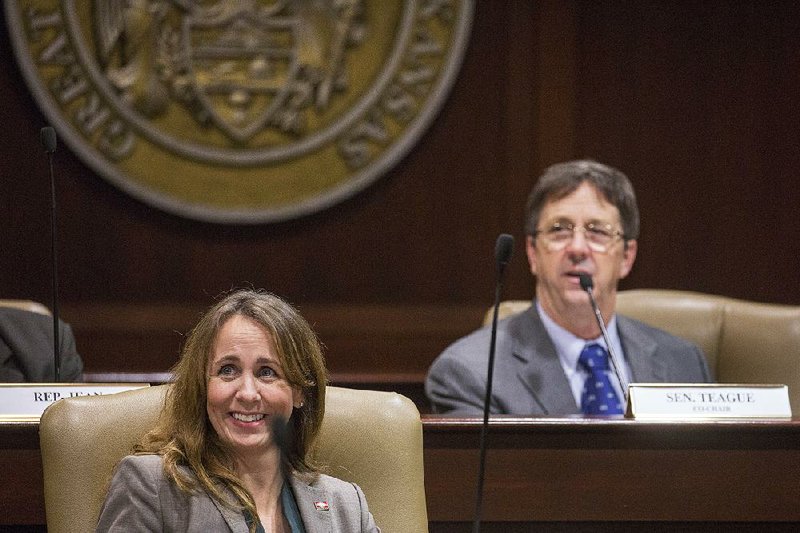The Legislature's Joint Budget Committee on Wednesday endorsed a bill that would grant $8.3 billion in spending authority for the Department of Human Services' Medical Services Division in the coming fiscal year. Support for the bill came without any debate about the merits of reauthorizing spending authority for the state's Medicaid expansion.
In a voice vote, the budget committee endorsed Senate Bill 196, the appropriation for the division for the fiscal year that starts July 1.
The Medicaid expansion is now known as Arkansas Works under Republican Gov. Asa Hutchinson. It was previously called the private option because the state pays for private health insurance for low-income Arkansans under the program.
The total Arkansas Works budget is $1.82 billion in fiscal 2018, with the federal government's share at $1.71 billion and the state's share $109 million, department spokesman Brandi Hinkle said after the committee's meeting.
Since the Republican-controlled Legislature and Democratic Gov. Mike Beebe approved the private option in 2013, supporters of Medicaid expansion have struggled each year to obtain the three-quarters vote required in the 100-member House and 35-member Senate for the division's appropriation. But Hutchinson and legislative leaders have said they don't expect that to be a problem in this year's session.
More than 300,000 Arkansans are covered under Arkansas Works. The state pays 5 percent of the cost of the program this year, while the federal government covers the rest. The state's share is scheduled to increase gradually to 10 percent in 2020 under current federal law.
Earlier this month, Hutchinson said he would ask the federal government to allow the state to cap participation in the Medicaid-expansion program at 100 percent of the poverty line, implement a work requirement, strengthen employer-sponsored health insurance and allow the state to determine eligibility. Hutchinson hopes to submit the waiver request to the federal government by June and put the changes into effect in January.
Hutchinson said reducing eligibility from 138 percent of the poverty line to 100 percent of the poverty line would reduce enrollment in Arkansas Works by about 60,000 people -- about 20 percent of the program. At 138 percent of the federal poverty line, the income cutoffs are at $16,643 for an individual and at $33,948 for a family of four. That would go down to about $12,060 for an individual and $24,600 for a family of four if the federal government approves the planned waiver.
Republican President Donald Trump and Republicans in Congress have vowed to repeal the federal law known as the Patient Protection and Affordable Care Act signed by Democratic President Barack Obama in 2010 and enact their own overhaul of the health care system.
During Wednesday's budget committee meeting, a committee co-chairman, Sen. Larry Teague, D-Nashville, asked Human Services Director Cindy Gillespie, "Do you have a plan to deal with whatever happens? I can't figure out what is going to happen."
"Our thoughts on that are to continue moving our state in the directions that have been laid out and that we've been talking about and, as we are doing that, honestly, a lot of our focus is on the same thing that we've been working on since I got here a year ago," Gillespie said.
"Our focus is on getting our current operations working well. In order to be able to deal with whatever is coming, we are going to have very efficient operations. We're going to have to know exactly what we have in terms of our spending, our monetary operations. We are going to need to understand who is on our rolls and where they are," she said.
Sen. Missy Irvin, R-Mountain View, said the state needs to have a contingency plan "if some of those people are shifted off" from the Medicaid expansion and onto traditional Medicaid. The federal government pays 95 percent of the cost of the Medicaid expansion program, but only 70 percent of traditional Medicaid.
"I'm not sure we are prepared for that," Irvin said. "Before we enter into a special session, this is something that we really have to identify and figure out. Is there any way that we can identify the number of people that are on the rolls for the expansion population that would potentially ... go back [to traditional Medicaid]?"
Hutchinson has discussed calling a special session on Medicaid expansion issues. The current regular session is scheduled to recess April 7.
Gillespie said department officials are "working to try to pull together a lot of data and run variations on analysis" so they can provide lawmakers with information and options.
A Section on 03/23/2017

